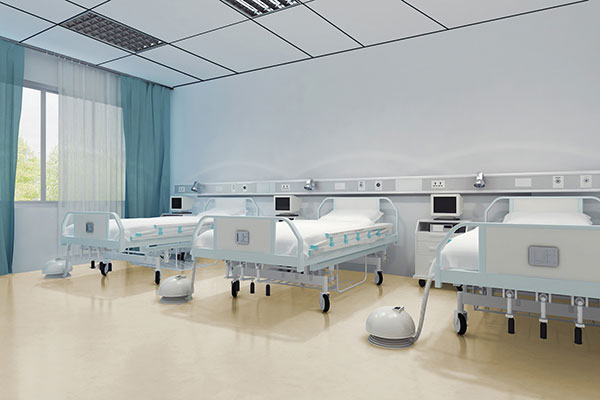At healthcare facilities, creating a clean and hygienic environment is of utmost importance. Antimicrobial coatings have become an invaluable solution in combating harmful microorganisms while providing a safer space for patients, staff and visitors.
What is antimicrobial coating made of?
Antimicrobial coatings are typically composed of multiple materials designed to inhibit the growth of bacteria, fungi, and viruses. Silver has long been recognized for its antibacterial properties; silver ions work by disrupting cell membranes of microorganisms that allow for their proliferation and multiplication. Other elements found in antimicrobial coatings may include copper, zinc, biocides and various biocide ingredients; all working together for maximum effect against germs.
How long does antimicrobial coating last?
Antimicrobial coating lifespan depends on many variables. On average, high-quality antimicrobial coating can last from several months to several years depending on its quality and other considerations. Aspects influencing its durability include:
Surface Types: Different surfaces will interact differently with coatings; smooth and non-porous materials like glass and metal may keep their coat for a longer time than porous fabrics or untreated wood, for example.
Level of Wear and Tear: Areas that experience heavy traffic or are frequently exposed to outside contact may experience more rapid coating degrading, such as hospital corridors with constant foot traffic or healthcare facilities where equipment is frequently handled by workers. As such, their coating could begin deteriorating more quickly.
Environment Conditions: Exposure to harsh chemicals, extreme temperatures or high humidity can have an impactful impact on coating longevity. A humid environment could expose it more readily to degradation.
Quality of the Coatings: Coatings made from durable materials and advanced bonding technologies tend to last longer, offering superior adhesion and resistance against abrasion.
Maintenance and Cleaning: Regular antimicrobial coating maintenance with appropriate cleaners compatible with its lifespan can extend its effectiveness over time. Harsh cleaners or aggressive methods could erode its protective qualities over time and compromise its efficacy over time.
How to apply antimicrobial coating?
There are multiple proven techniques for applying antimicrobial coating.
Surface spraying is one such method, which utilizes a spray applicator to evenly apply an antimicrobial coating onto various surfaces such as walls, floors, furniture and equipment. While surface spraying is quick and convenient, its effectiveness may become limited over time due to abrasion from cleaning processes or wear/tear.
Another approach involves integrating antimicrobial agents directly into raw materials used to manufacture certain products, such as plastics, textiles or coatings. By embedding an antimicrobial agent within these materials during their production processes, its antimicrobial effect will last longer because it becomes an integral part of them and less likely to be removed or degraded quickly. This approach provides more permanent protection due to reduced likelihood of removal or degradation.
When applying antimicrobial coating, it is vital that the user carefully follow the manufacturer’s instructions for surface preparation, application methods and drying times. Furthermore, to achieve optimal antimicrobial protection it is vital that an even and thorough coating application takes place.
Healthcare facilities, as well as other environments where hygiene is of critical importance, may need professional applicators to ensure proper application and effectiveness of an antimicrobial coating system. They can also advise on which coating method best meets their facility’s particular requirements and characteristics.
Do antimicrobial coatings work?
Yes, antimicrobial coatings can be an extremely effective means of controlling harmful microorganisms on surfaces. Studies have demonstrated that these coatings can significantly decrease bacteria, fungi and viruses that grow on surfaces, thus decreasing risk of infection. It should be noted that antimicrobial coatings should not replace good hygiene practices and regular cleaning, rather they should be combined with other infection control measures for maximum protection.
See more about antimicrobial testing
Are antimicrobial coatings safe to use?
Antimicrobial coatings may be effective, though their efficacy will depend on various factors.
Antimicrobial coatings can be highly effective. Their goal is to inhibit the spread of microorganisms like bacteria, fungi and viruses; such coatings contain active ingredients that disrupt cell walls or metabolic processes of microbes that multiply on surfaces, stopping them from propagating further and remaining alive on these surfaces.
Antimicrobial coatings on medical equipment and surfaces may help decrease healthcare-associated infections in healthcare settings, while in public spaces like airports or schools antimicrobial coatings on high-touch surfaces could potentially lower transmission of pathogens.
On the other hand, antimicrobial coatings do not guarantee complete effectiveness; their performance can be limited by certain factors. For instance, damaged or worn off coatings or organic type of antimicrobial agent could reduce antimicrobial properties over time and heavy use or exposure to harsh chemicals may erode them even more rapidly.
Conclusion
Conclusion Antimicrobial coatings can be an invaluable asset in healthcare facilities. Composed of materials like silver and biocides, they can effectively prevent the growth of microbes. Their lifespan depends on various factors; spraying is one method used for applying them; others incorporate it directly into raw materials for longer durability. While effective, antimicrobial coatings should never replace proper hygiene; although generally safe they could potentially pose concerns; overall they enhance safety when utilized appropriately with other measures.


-300x210.jpg)
